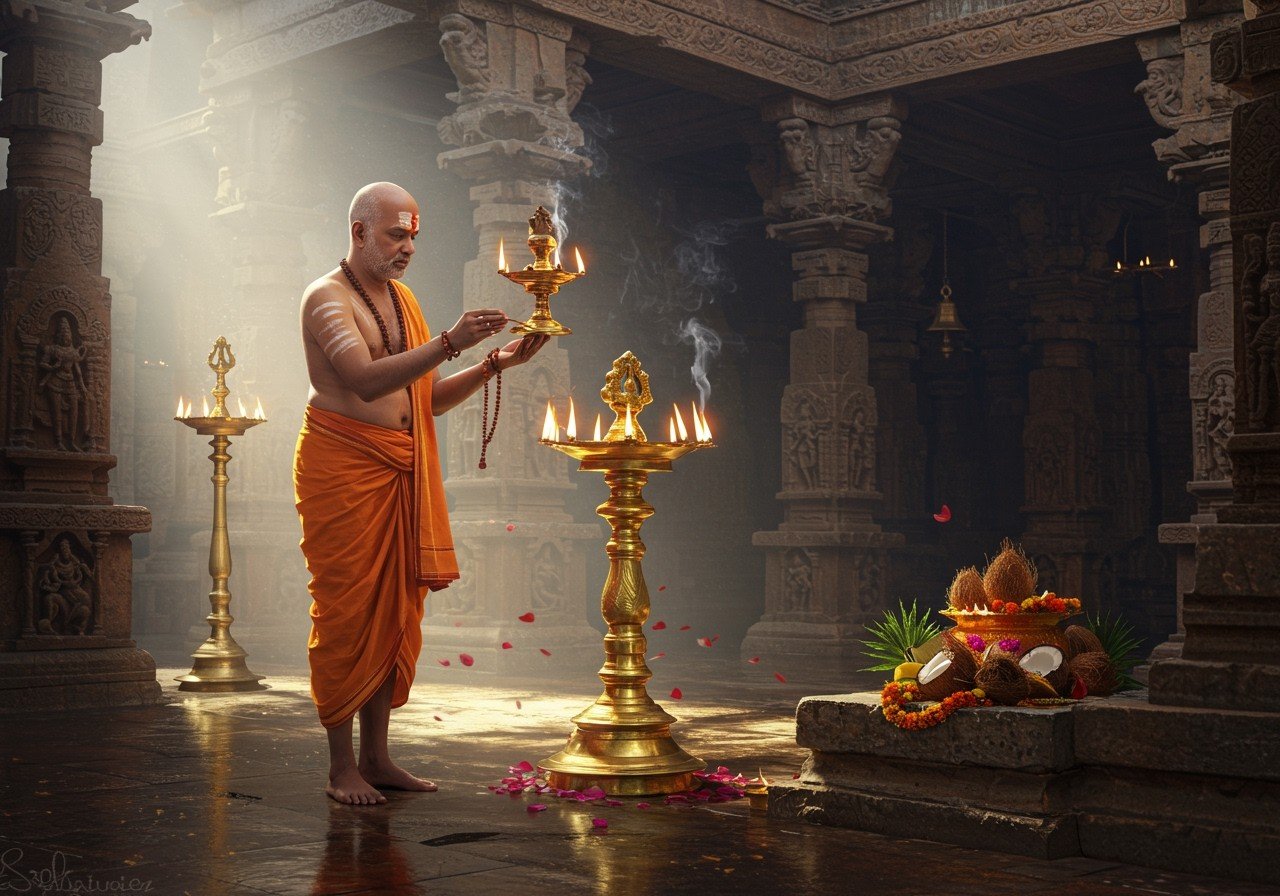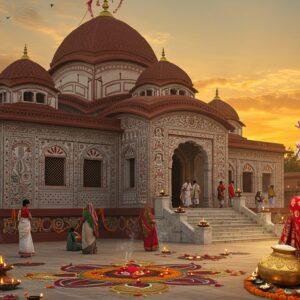
In the sacred spaces of Hindu temples, Pujaris, revered as priests or pandits, hold a vital role. They are the keepers of our traditions, the conductors of our sacred rituals, and the bridge between the devotee and the divine. As our world changes, so too does the role of the Pujari, balancing ancient practices with the needs of today. Understanding their significance helps us appreciate the spiritual depth they bring to our lives.
What Does a Pujari Do? Exploring the Role of a Hindu Temple Priest
A Pujari, often referred to as a temple priest, is a central figure in Hindu religious life. They are the custodians of our rituals and ceremonies, ensuring our spiritual traditions are passed down through generations. Unlike Gurus or Swamis, who primarily focus on teaching spiritual principles, Pujaris dedicate themselves to the daily rituals and sanctity of the temple. The path to becoming a Pujari involves dedicated spiritual training, encompassing the study of sacred texts, mastery of rituals, and a deep understanding of religious duties. Their role is one of profound devotion, serving both the deity and the community, connecting people with their faith through structured practices and ceremonies.
Delving into the Duties of a Pujari
Within the rich tapestry of Hindu worship, Pujaris are the guardians of our sacred traditions. They perform the rituals and ceremonies that are the heart of temple life. Their presence ensures that these spiritual practices are carried out with reverence and authenticity.
Core Responsibilities: The Essence of Temple Worship
A Pujari’s day revolves around devotion and ritual. They lead various ceremonies, from the daily deity worship (archana, homa, aarti) to grand celebrations like Durga Puja and Shiva Abhishekham. These sacred rituals connect devotees with the divine, creating a palpable spiritual atmosphere within the temple. At poojn.in, you can find a wide selection of items needed for these ceremonies, such as Kakkal fruit, Kalwa Raksha Sutra, and Durga Puja kits. This ensures you have everything you need for a blessed and authentic experience.
Daily prayers, or pujas, are the cornerstone of a Pujari’s duties. Through these rituals—the chanting of mantras, the ringing of bells, the offering of prayers—they honor the deities. This daily devotion keeps the spiritual energy of the temple vibrant and alive.
Beyond Rituals: Guidance and Community Leadership
Pujaris offer more than just the performance of rituals; they provide spiritual guidance and support to devotees seeking deeper understanding. They share wisdom rooted in Hindu scriptures and offer counsel during challenging times, acting as spiritual mentors. They also play a crucial role in preserving sacred texts and ensuring these teachings are carried forward through generations. You can deepen your understanding of these rituals by exploring articles like Sacred Offerings in Hindu Rituals and Bhajans and Kirtans on poojn.in.
Community engagement is an important aspect of a Pujari’s role. By actively participating in social activities, Pujaris foster harmony and guide individuals towards ethical living. They champion community cohesion through educational initiatives and charitable work.
Additional Duties: The Practical Aspects of Service
In smaller temples, Pujaris may also take on additional responsibilities. This might include preparing prasadam, the sacred food offerings, which are then shared with devotees as a symbol of divine blessings. They may also be involved in the upkeep of the temple, ensuring its cleanliness, creating beautiful garlands for the deities, and safeguarding the sacred space.
As mediators between the deity and the devotees, Pujaris ensure everyone has access to the divine presence and partakes in the offerings. They also adapt ancient rituals to resonate with modern sensibilities, making these teachings accessible in today’s technology-driven world.
Qualities and Requirements: A Life of Devotion
To fulfill their sacred duties, Pujaris require a comprehensive knowledge of worship services. They must be proficient in chanting prayers in Sanskrit or vernacular languages and be familiar with the various items used in ceremonies and rituals, such as flowers, rice, coconut, and clarified butter (ghee). Some receive traditional training passed down through lineages, while others pursue independent study to gain this sacred knowledge.
Living a disciplined life is paramount for a Pujari. Traditionally, they adhere to a strict vegetarian diet and abstain from alcohol and gambling. This disciplined lifestyle maintains their spiritual purity, enabling them to serve as effective guides for their community.
An Important Distinction: Pujari vs. Purohit
It’s important to understand the distinction between a Pujari and a Purohit. While a Pujari focuses on the temple rituals, a Purohit has a broader societal role, often performing sacrifices, possessing deep literacy in scriptures, and adhering to a strict code of conduct. Traditionally, the role of Purohit was fulfilled by a Brahmin, whereas anyone with the proper initiation and knowledge, regardless of birth or caste, can become a Pujari.
How Poojn.in Supports Your Spiritual Journey
At poojn.in, we understand the importance of connecting with the divine. We make it easier for you to access the resources and guidance you need for your spiritual practices. Poojn.in offers a vast collection of authentic puja items, from Laddu Gopal statues to Maa Manasha murtis, ensuring you have everything necessary for your personal devotion or temple rituals.
Conclusion: The Enduring Legacy of Pujaris
Pujaris are the heart and soul of Hindu traditions, bridging the gap between the divine and our everyday lives. With dedication and grace, they uphold the spiritual essence of our temples. They ensure our rituals and teachings remain vibrant and relevant, adapting to modern times while preserving ancient wisdom. They are not just performers of rituals but nurturers of our spiritual well-being. Embracing both tradition and modernity, Pujaris stand as pillars of our cultural continuity and spiritual enlightenment, keeping the sacred flame alive for generations to come.


